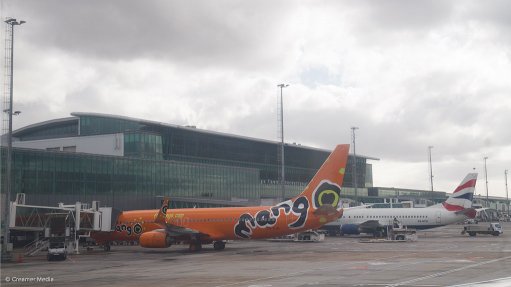
Cape Town International Airport
Photo by: Duane Daws/Creamer Media
Cape Town International Airport (CTIA), which belongs to the State-owned Airports Company South Africa (Acsa), has received authorisation from the Department of Environmental Affairs (DEA) to proceed with its planned runway realignment and other necessary infrastructural developments. Acsa announced this on Tuesday.
“We are indeed pleased to have reached this milestone within the environmental assessment process,” affirmed CTIA GM Deon Cloete. “It has required a great deal of planning and continuing engagement with communities to get to this point.” To date, the process has involved almost four years of planning, assessment and significant public consultation.
The DEA’s authorisation covers both the realignment of, and extensions to, the runway, plus the required new taxi-ways and aircraft parking stands. “This runway project is not only about the growth of the airport, it’s about unlocking the growth potential of Cape Town and the Western Cape and we are pleased to be able to further contribute to the development of the region,” he pointed out.
The DEA’s decision was the outcome of a thorough examination of an environmental impact assessment (EIA) by independent environmental consultants SRK Consulting. This included submissions by various interested and affected parties. In making its decision, the DEA used processes and criteria established in the Environmental Management Act.
SRK Consulting must now inform all interested and affected parties, within 12 days of the DEA’s decision, of that decision. It must also advertise the environmental authorisation more widely. Appeals against the DEA’s determination are possible, but notification of such appeals must be given to the department within 20 days of its authorisation being issued.
This environmental authorisation does not mark the end of the EIA process. “We still have a way to go and if all approvals are received, at best, construction is estimated to begin mid-2018,” he noted. “We will continue to follow a fair and responsible approach to this development.”